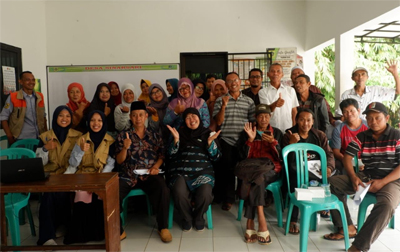Lecturer Serving IPB University Holds Zoonosis Prevention and Training on Village Chicken Farming in Sinarsari

In the framework of the Agrocreative Field Station (SLAK) of the Lecturer Serving program in 2019, the Institute for Research and Community Service (LPPM) IPB University sent two lecturers to Sinarsari Village, Dramaga District, Bogor Regency, West Java, (22/11). The Serving Lecturer Program is a community service activity for non professors and professors. One of the goals of a dedicated lecturer is to encourage and facilitate lecturers in community service activities.
The socialization was carried out at Sinarsari Village Office with two speakers, Dr. Sri Murtini from the Faculty of Veterinary Medicine (FKH) IPB University and Dr. Sri Darwati from the Faculty of Animal Husbandry (Fapet). The socialization was attended by 40 participants from Sinarsari Village and surrounding areas. Participants who attended were community leaders, native chicken farmers, community members and the general public.
Dr. Sri Murtini conveyed about the prevention of zoonoses to create healthy families through Clean and Healthy Behavior (PHBS). “Clean and healthy living behaviors are all health behaviors that are carried out on awareness so that family members can help themselves in the health sector,” he said.
One type of zoonosis that is conveyed is the transmission of worms from animals to humans. Transmission of worms from animals to humans can be directly unintentional as swallowed eggs and through food media such as vegetables contaminated with eggs or worm larvae.
“Clean and healthy living behavior is sometimes considered trivial by the community for example by washing hands with soap after activities and before eating and drinking. This turned out to be very impacting on human health. Because disease pollution from animals can apparently through intermediaries that we often eat and consider healthy, for example fresh vegetables. If we do not get clean and healthy living by washing vegetables, we will transmit diseases such as contracting worms that will attack human organs,” he said.
Sri Murtini added, some types of fruits and vegetables such as watercress, water spinach, spinach, celery, and cabbage can contain worms. So that efforts are needed to reduce parasitic contamination in fruits and vegetables. These efforts should be done from upstream (fruit / vegetable gardens) to downstream (ready for consumption). Most people like to consume raw vegetables, so to prevent worms need to be carried out the washing process that is good and right to eliminate and even kill parasites.
At the end of the activity session, the public is invited to discuss by asking questions and the guest lecturer will answer the question. With the counseling on clean and healthy living behavior, it is hoped that the community will be able to apply it in their daily lives.
While Sri Darwati explained about the cultivation of native chickens to meet the needs of animal protein. One of the local chickens whose existence is spread in the community from Sabang to Merauke is a native chicken. Based on its potential, the native chicken is suitable to be developed and used as a food product that can support a protein fulfillment program to prevent stunting. Prices of native chicken products such as eggs and meat tend to have a stable price compared to broiler eggs and broilers.
“Giving a mixture of rice bran and cassava leaves can be done in areas that have the potential for both types of feed ingredients. Noteworthy from cassava leaves is the content of cyanide acid (HCN) found in fresh cassava leaves. The processing that is able to reduce HCN content in cassava is boiling, drying, soaking, fermentation and a combination of these processes,” he said. He added, increasing the animal food security of Indonesian people could be started from every household by maintaining 5-7 chickens per house.
Each head of family can cultivate 5-6 female chickens and one male chicken in fulfillment of family animal protein. Within a day, from a number of chickens in producing two eggs every day or if sold is equivalent to Rp 5,000. This can be bought two tempe boards if you are bored with eating eggs. With this counseling, the hope is to be able to motivate and provide knowledge to the community about native chicken farming.
The Head of Sinarsari Village, Ukon said, this counseling and training was very beneficial for the Sinarsari Village community in increasing income. “The activities of the Dedicated Lecturer are expected to be carried out continuously so that the community’s knowledge and skills increase,” he added. (NR)
keywords: Lecturer Serves IPB University, Zoonosis Prevention and Kampung Chicken Farming Training, Sinarsari village



